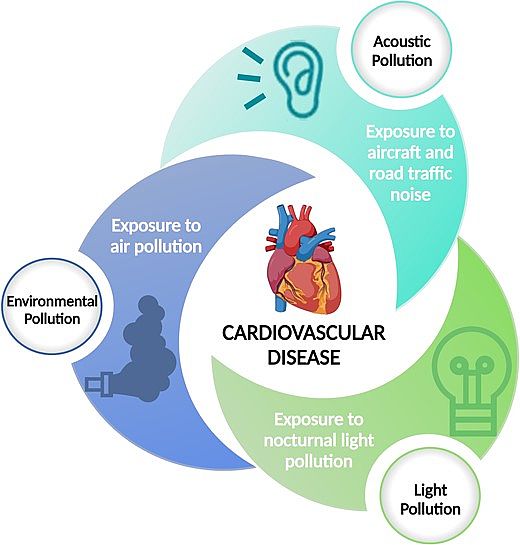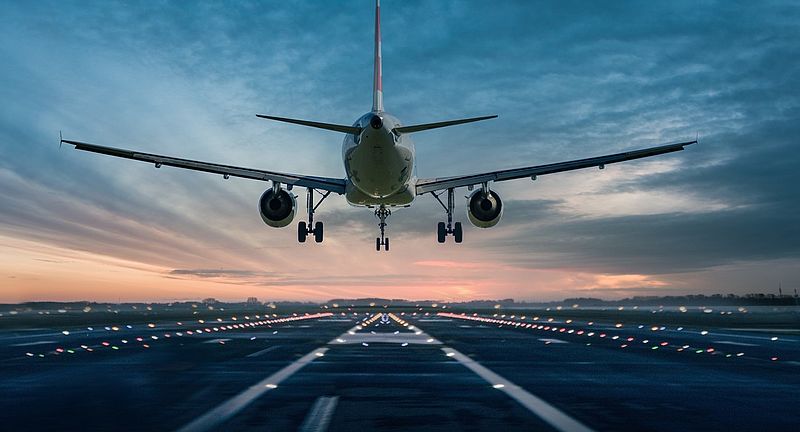Loud noise is not only annoying, it is also detrimental to health: According to the World Health Organisation (WHO), 1.6 million healthy years of life are lost in Europe every year. The European Environment Agency (EEA) reports that every year 113 million people are exposed to road traffic noise of more than 55 decibels. A further 22 million are exposed to excessive levels of rail noise and 4 million to aircraft noise, while 6.5 million suffer from severe sleep disturbance. This makes noise pollution the second most common cause of death from environmental pollution, after fine particulate matter. The International Day against Noise on the 26th of April highlights the harmful effects of noise on health and oberall quality of life.
A study published today in the European Journal of Preventive Cardiology and led by Prof. Dr. Thomas Münzel, Director of the Centre for Cardiology at the Johannes Gutenberg University in Mainz, Germany, shows how people affected by noise can become active themselves (Personal Mitigation Measures). Until now, it was not known which pharmacological or non-pharmacological measures were effective in reducing the effects of noise. For the first time, Münzel and his team investigated different interventions with which noise damage can possibly be influenced. The most effective measure would be to reduce the noise. However, recent calculations by the EEA show that traffic noise is likely to increase in the coming years.
Noise already affects the health after just a few days
To study the effects of aircraft noise on the vascular system, mice were exposed to aircraft noise for one, two or four days. The noise led to an increase in stress hormone levels and blood pressure. There was a pronounced endothelial dysfunction with inflammatory reactions in the blood vessels, caused mainly by the infiltration of radical-forming macrophages. These changes were not restricted to the vascular system, but could also be detected in the brain.
"For me, it was surprising how quickly noise can have a negative impact on health after just a few days," says Prof. Thomas Münzel. The evidence of vascular damage in mice within 24 hours also fits in with the results of the group, which found endothelial dysfunction in young medical students after just one night of exposure to aircraft or train noise.
In a further step, the team investigated the role of AMP-activated protein kinase (AMPK). This enzyme is activated when the cell is hungry and builds up new energy reserves. It also has a strong anti-inflammatory effect and reduces oxidative stress, so it could theoretically mitigate the effects of noise. It is also known that AMPK can be stimulated by exercise, fasting and medication.
Exercise, fasting and drugs help counteract negative effects of noise
To activate the AMPK in mice, they were given a seven-week exercise programme in which they voluntarily ran on a treadmill. The researchers also tested the effect of an eight-week fast with a gradual reduction in food intake, as well as a three-day drug treatment (AICAR, 5-aminoimidazole-4-carboxamide ribonucleotide; AMP analogue; works in the same way as the anti-diabetic drug metformin). Each of these interventions reversed the negative effects of the noise: blood pressure and radical formation normalised, vascular dysfunction declined and the inflammatory response was reduced.
Endothelial AMP kinase had been identified in earlier studies as an important mediator of anti-inflammatory and antioxidant stress effects. In a further step, the team used this to demonstrate the importance of the enzyme in this context as well: The positive effects of exercise, diet and pharmacological activation were lost in mice when the endothelial AMP kinase was knocked out.
"The paper is an important experimental hint and a wonderful approach for further clinical studies," says Münzel. The study has good news for physically active people: Those who exercise regularly make their blood vessels more resistant to noise stress. It is also possible that drugs can help against noise stress.
Conclusions
1. The most important thing is still to reduce noise to the levels recommended by the WHO for road, rail and air traffic noise.
2. The recently presented experimental results on AMP kinase and noise damage give first indications on how noise induced cardiovascular damage can possibly be prevented or alleviated.
Further research on environmental factors
In another study published in the renowned journal HYPERTENSION, the Mainz cardiologist and an international team of researchers provide an overview of the effects of particulate matter and noise on cardiovascular diseases, the significance of which has increased dramatically. In particular, air pollution (particulate matter 2.5µm) leads to an excess mortality of 8.8 million per year, mainly due to cardiovascular diseases such as ischaemic heart disease, stroke, diabetes and arterial hypertension. The review articles by Omar Hahad et al. discuss current epidemiology, possible causes and interventions, as well as current research gaps and future challenges, emphasising that environmental risk factors for cardiovascular disease are still drastically underestimated.
Scientific contact: Univ.-Prof. Dr. Thomas Münzel, Centre for Cardiology - Cardiology I, University of Mainz, tmuenzel(at)uni-mainz.de
Press contact: Christine Vollgraf, Press and Public Relations, German Centre for Cardiovascular Research (DZHK), Tel.: 030 3465 529 02, presse(at)dzhk.de



